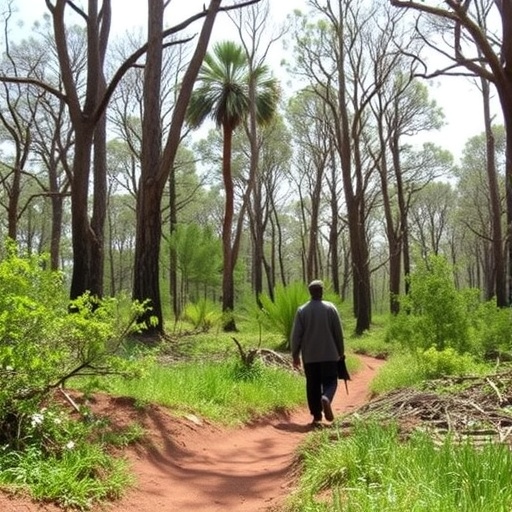In the dry forests of Northwestern Ethiopia, participatory forest management cooperatives have gained prominence as vital components for sustainable resource management and community empowerment. A recent study led by Woldie and Alemu emphasizes the intricate arrangements and performance dynamics of these cooperatives, illustrating how local communities can sustainably manage their forest resources while enhancing their socio-economic conditions. The findings shed light on the challenges and opportunities that arise when communities are given a stake in their environmental heritage.
Participatory forest management cooperatives represent a shift from top-down approaches to forest governance towards models that prioritize local participation and decision-making. These cooperatives engage local stakeholders, allowing them to influence forest management practices. This democratization of forest governance aims to tailor management strategies to the specific ecological and social contexts of the dry forests, acknowledging the unique knowledge and needs of local communities.
The dry forests of Northwestern Ethiopia are characterized by their biodiversity and resilience, yet they face significant threats from deforestation, land degradation, and climate change. These environmental pressures not only threaten the ecosystems but also the livelihoods of the communities that depend on these resources for their survival. The establishment of participatory management cooperatives provides an opportunity to mitigate these challenges through collective action and resource sharing.
The study explores the operational frameworks of these cooperatives, examining how they collaborate with governmental bodies and NGOs to facilitate sustainable forest management. Effective arrangements include regular meetings where cooperative members discuss management strategies, resource allocations, and community needs. This participatory approach fosters a sense of ownership, empowering communities to take responsibility for their natural resources and to engage in conservation practices that benefit both the environment and their livelihoods.
In addition to governance structures, the economic performance of these cooperatives is vital to their sustainability. By pooling resources, members can invest in community-led initiatives, from sustainable logging practices to the development of eco-tourism ventures. Such economic diversification not only uplifts individual members but also strengthens the collective resilience of the community against economic shocks or environmental changes.
Furthermore, the research highlights the role of education and capacity building in the success of participatory forest management cooperatives. Training programs that improve members’ understanding of sustainable practices and their rights as stakeholders are essential. This empowerment through education creates a more informed membership that can advocate for their interests while ensuring the health of their forests.
Building socio-cultural ties within communities is equally essential to the success of these cooperatives. Local traditions and customs play a crucial role in shaping collective identity and ensuring communal cooperation. By integrating these cultural aspects into forest management strategies, cooperatives can reinforce bonds among members and foster a collective commitment to sustainable practices.
However, challenges persist. The study notes that while these cooperatives have been effective in some areas, they can also face internal conflicts among members and external pressures from larger economic interests, such as agriculture or logging. These pressures may undermine cooperative dynamics and lead to unsustainable practices if not managed effectively.
Additionally, the role of external stakeholders, including government agencies and NGOs, presents both opportunities and challenges. While these entities can provide necessary resources and expertise, their influence can complicate cooperative governance. Ensuring that the voices of local members are prioritized is critical for maintaining the integrity and purpose of these cooperatives.
The long-term success and scalability of participatory forest management cooperatives depend not only on local engagement but also on supportive policy frameworks at higher governance levels. Advocating for policies that recognize and support community-led initiatives is essential. Such an approach can create an enabling environment where cooperative models can thrive and serve as blueprints for sustainable resource management in other regions facing similar ecological challenges.
The implications of this research extend beyond the forests of Northwestern Ethiopia. As climate change intensifies and biodiversity loss accelerates globally, the lessons learned from participatory forest management cooperatives have the potential to inform broader conservation strategies. Policymakers and practitioners around the world can draw from these insights to foster collaboration between local communities and environmental stewardship.
In conclusion, the study by Woldie and Alemu makes a compelling case for the transformative potential of participatory forest management cooperatives. These arrangements not only foster community resilience but also promote sustainable practices that can ensure the health of vital ecosystems. As the world grapples with environmental challenges, empowering communities and creating inclusive governance frameworks will be paramount to achieving long-term sustainability.
With its unique context, Northwestern Ethiopia serves as a case study for successful participatory forest management. The interplay between local engagement, economic diversification, and supportive governance structures offers crucial insights for other regions facing similar ecological and socio-economic challenges. As the movement toward sustainable resource management continues to evolve, local communities must remain at the forefront of these efforts, turning their knowledge and investments into tangible benefits for both people and nature.
The future of participatory forest management cooperatives in Ethiopia and beyond hinges on continued research, community engagement, and adaptation to changing environmental conditions. By studying and replicating successful strategies, we can work toward a more sustainable and equitable future for all, safeguarding the rich biodiversity that our planet offers while enhancing community livelihoods.
Subject of Research: Participatory forest management cooperatives in Northwestern Ethiopia.
Article Title: Arrangements and performance of participatory forest management cooperatives in the dry forests of Northwestern Ethiopia.
Article References:
Woldie, Z., Alemu, A. Arrangements and performance of participatory forest management cooperatives in the dry forests of Northwestern Ethiopia.
Discov Sustain 6, 1176 (2025). https://doi.org/10.1007/s43621-025-01971-7
Image Credits: AI Generated
DOI: 10.1007/s43621-025-01971-7
Keywords: Participatory forest management, cooperatives, sustainable resource management, community empowerment, Ethiopia.




